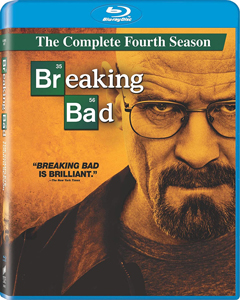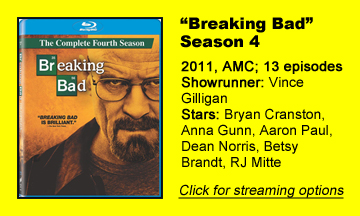Over six Sundays, we’re looking back at the five seasons (and one movie) of one of the last decade’s elite TV series: AMC’s “Breaking Bad.” Next up is Season 4 (2011):
Worth rooting for
“Breaking Bad” Season 4 pulls off a remarkable writing and acting trick wherein we see almost everyone as a protagonist worth rooting for. Even Gus Fring (Giancarlo Esposito), at times the most chilling of TV villains, becomes sympathetic is his backstory episode, “Hermanos” (8).
That leads to the satisfying “Salud” (10), where he cleverly achieves vengeance on Don Eladio (Steven Bauer), the man who allowed Gus into the border drug trade but at the terrible cost of his beloved brother.
And yet in the season finale, “Face Off” (13), Walter (Bryan Cranston) finally gets to Gus, cleverly using ancient wheelchair-bound Hector’s (Mark Margolis) desire for vengeance as the tool.
It’s always difficult to send out a supervillain in satisfying fashion, but episode writer-director and showrunner Vince Gilligan achieves it, capping it off with one of the most gruesome images of the series.
After Hector’s wheelchair bomb goes off, we see Gus emerge from the room, and we assume it’s yet another moment indicating that this villain can’t be gotten to. And then the camera pans around to reveal that the other side of Gus’ face has been blown off, and he collapses, dead.
So Season 4 gives us an episode where we are deeply satisfied that Gus gets revenge on Don Eladio, and a few episodes later we are deeply satisfied that Walter takes out Gus. That’s quite an achievement.
Increase in contrivances
Overall, I rate Season 4 slightly below Season 3 because of an increase in contrivances – not enough to endanger “Breaking Bad’s” status as an elite show, but enough that I noticed it.
In “Crawl Space” (11), Ted (Christopher Cousins) tries to run away from Saul’s (Bob Odenkirk) henchmen, trips over a rug and dies in the fall. It wouldn’t have been inappropriate to play the “Curb Your Enthusiasm” music at that point.
Tax-cheating businessman Ted is never what he could’ve been as a character, but he does go out serving a plot purpose: taking enough of the Whites’ money as a gift (in order to pay off the IRS) to leave Walter without enough to pay for new identities for himself and his family.
Saul’s henchmen are played by comedians Bill Burr and Lavell Crawford. Although they play the roles straight, there is a darkly comedic tinge every time Kuby and Huell are on screen – previously, Kuby tricks Bogdan (Marius Stan) into giving up the car wash to the Whites – and that’s appropriate for this season.
While dark comedy is part and parcel to the premise of a high school teacher who resorts to cooking meth to provide for his family, Season 4 really reaches for it. Another fun example is when Hector visits the DEA (part of Walt’s grand scheme to get to Gus) and uses his bell-signaling system to spell out vulgarities to a room of absorbed officials.
A falling out
The seeds of the final showdown between the protagonists and Gus are planted early in the season with Jesse’s (Aaron Paul) lost weekend. As with Walt, Jesse is more and more worried about the eventual consequences of working for Gus.
You may have partied hard before, but you’ve never partied like Jesse when trying to 1, get his mind off his killing of unfortunate meth cook Gale (David Costabile) in the Season 3 finale, and 2, keep enough people around him that his enemies are less likely to make a move.
The house party’s attendance starts with his friends and hot chicks but devolves into thieves and bums three days later.
Season 4 tries to establish a big-time falling out between Walter and Jesse, and I don’t quite believe it. It’s certainly powerful stuff when they come to blows in “Bug” (9) and when Jesse holds a gun to Walt’s head in the finale, before understanding that it’s Gus – not Walt – who is capable of poisoning a child to achieve his desired ends.
But with Walt and Jesse both established as good-hearted people deep down, I don’t quite buy that they’d become enemies, even with Gus trying to break up their partnership by giving Jesse more responsibility.
Re-examining Walter White
That said, the season’s closing image asks us to re-examine Walt. He has a pot of Lily of the Valley flowers in his yard, implying that he poisoned young Brock in order to frame Gus and set the conclusive events in motion.
In the moment, it seems out of character, but “Breaking Bad” can still earn it in the final season, which will no doubt be about Walt crossing that line from good to bad – a journey we’ve seen Gus (Walter’s foil in addition to being his boss and enemy) travel in Season 4 via the flashback.
Gilligan and his writers do give Walter his villainous moments this year, though. As wife Skyler (Anna Gunn) partially enters his game – at least the money-laundering side, via their car wash – he must explain to her more about what’s going on.
(Skyler is widely viewed as annoying – including by me — but to be fair, her actions are not illogical based on the information Walt deigns to give her. She functions as a warning of how an ally can become an accidental enemy if left out of the loop.)
‘The one who knocks’
Toward that end, “Cornered” (6) includes one of the all-time great Walter White lines:
“No, you clearly don’t know who you’re talking to, so let me clue you in. I am not in danger, Skyler. I am the danger. A guy opens his door and gets shot and you think that of me? No. I am the one who knocks!”
It’s a line we’ll have to remember going into Season 5, because if he really poisoned an innocent child as part of a scheme to see Gus dead, then Walter is now backing up his words. Yet he’s still the hero of this story, and his actions are logical from his own point of view.
Not only that, but we all want to be “the one who knocks,” and many of us will probably surprise ourselves with how long we root for Walter.



